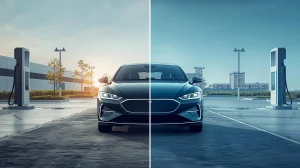The Rise of Electric Vehicles: Revolutionizing the Automotive Industry

In recent years, electric vehicles (EVs) have emerged as a transformative force within the automotive industry, representing a pivotal shift towards sustainable mobility. This shift is driven by advancements in technology, increasing environmental awareness, and government policies promoting clean energy. Let’s delve deeper into the world of electric vehicles and explore the factors contributing to their rapid rise.
1. Technological Advancements
Electric vehicles are powered by rechargeable batteries and electric motors, replacing traditional internal combustion engines. The development of lithium-ion battery technology has significantly improved the performance and range of EVs, making them more practical for everyday use. Companies like Tesla, Nissan, and Chevrolet have been at the forefront of developing cutting-edge battery technology, enabling EVs to achieve longer ranges and faster charging times.
2. Environmental Benefits
One of the primary drivers behind the adoption of electric vehicles is their environmental friendliness. Unlike gasoline or diesel-powered cars, EVs produce zero tailpipe emissions, reducing air pollution and greenhouse gas emissions. As the world becomes increasingly conscious of climate change and its impacts, electric vehicles offer a promising solution to reduce carbon footprints and combat environmental degradation.
3. Government Incentives and Policies
Many governments around the world have implemented incentives and policies to accelerate the adoption of electric vehicles. These include tax credits, rebates, and subsidies for purchasing EVs, as well as investments in charging infrastructure. Countries like Norway, the Netherlands, and China have been particularly proactive in promoting electric mobility through supportive policies and ambitious targets for electric vehicle sales.
4. Cost Reduction and Affordability
As production scales up and technology advances, the cost of manufacturing electric vehicles continues to decline. This has made EVs more affordable and accessible to a wider range of consumers. Additionally, lower operational costs due to cheaper electricity compared to gasoline or diesel fuel make electric vehicles an attractive long-term investment.
5. Expanding Charging Infrastructure
The availability of charging infrastructure is crucial for the widespread adoption of electric vehicles. Governments, businesses, and utility companies are investing heavily in expanding the network of charging stations, making it more convenient for EV owners to recharge their vehicles. Fast-charging stations are being deployed along highways and in urban areas to alleviate range anxiety and encourage longer trips.
6. Innovation in Vehicle Design
Electric vehicles have sparked innovation in vehicle design and engineering. The absence of a traditional engine and transmission allows for more flexible interior layouts and creative aerodynamic designs. Many EV manufacturers are capitalizing on this opportunity to create sleek, futuristic-looking cars that appeal to tech-savvy consumers.
7. Impact on the Energy Sector
The widespread adoption of electric vehicles is reshaping the energy sector by increasing demand for electricity. This shift presents opportunities for integrating renewable energy sources like solar and wind power into the grid, further reducing carbon emissions associated with transportation.
8. Global Market Growth
The global electric vehicle market is experiencing exponential growth, with sales expected to continue rising in the coming years. Major automakers are ramping up their EV production and introducing new models to meet increasing consumer demand. This competitive landscape is driving further innovation and investment in electric vehicle technology.
9. Challenges and Future Outlook
Despite their many advantages, electric vehicles still face challenges such as limited range, high initial costs, and concerns over battery disposal and recycling. However, ongoing research and development efforts are addressing these challenges, paving the way for a future where electric vehicles dominate the roads and contribute to a cleaner, more sustainable transportation ecosystem.
In conclusion, electric vehicles represent a significant paradigm shift in the automotive industry, offering a cleaner, more efficient alternative to conventional gasoline-powered cars. With ongoing advancements in technology and supportive government policies, electric vehicles are poised to revolutionize transportation and play a crucial role in combating climate change. As consumer preferences continue to evolve and technology improves, electric vehicles are set to become the mainstream choice for environmentally conscious drivers worldwide.







